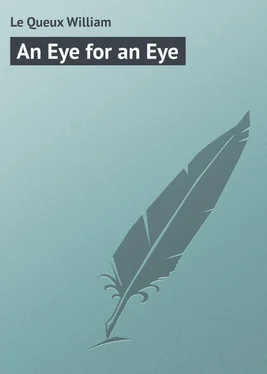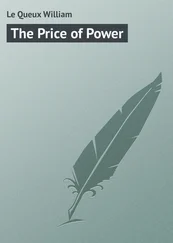William Le Queux - An Eye for an Eye
Здесь есть возможность читать онлайн «William Le Queux - An Eye for an Eye» — ознакомительный отрывок электронной книги совершенно бесплатно, а после прочтения отрывка купить полную версию. В некоторых случаях можно слушать аудио, скачать через торрент в формате fb2 и присутствует краткое содержание. Жанр: foreign_prose, на английском языке. Описание произведения, (предисловие) а так же отзывы посетителей доступны на портале библиотеки ЛибКат.
- Название:An Eye for an Eye
- Автор:
- Жанр:
- Год:неизвестен
- ISBN:нет данных
- Рейтинг книги:3 / 5. Голосов: 1
-
Избранное:Добавить в избранное
- Отзывы:
-
Ваша оценка:
- 60
- 1
- 2
- 3
- 4
- 5
An Eye for an Eye: краткое содержание, описание и аннотация
Предлагаем к чтению аннотацию, описание, краткое содержание или предисловие (зависит от того, что написал сам автор книги «An Eye for an Eye»). Если вы не нашли необходимую информацию о книге — напишите в комментариях, мы постараемся отыскать её.
An Eye for an Eye — читать онлайн ознакомительный отрывок
Ниже представлен текст книги, разбитый по страницам. Система сохранения места последней прочитанной страницы, позволяет с удобством читать онлайн бесплатно книгу «An Eye for an Eye», без необходимости каждый раз заново искать на чём Вы остановились. Поставьте закладку, и сможете в любой момент перейти на страницу, на которой закончили чтение.
Интервал:
Закладка:
Le Queux William
An Eye for an Eye
Chapter One
The Mystery Man
“Hush! Think, if you were overheard!”
“Well, my dear fellow, I only assert what’s true,” I said.
“I really can’t believe it,” observed my companion, shaking his head doubtfully.
“But I’m absolutely satisfied,” I answered. “The two affairs, mysterious as they are, are more closely connected than we imagine. I thought I had convinced you by my arguments. A revelation will be made some day, and it will be a startling one – depend upon it.”
“You’ll never convince me without absolute proof – never. The idea is far too hazy to be possible. Only a madman could dream such a thing.”
“Then I suppose I’m a madman?” I laughed.
“No, old chap. I don’t mean any insult, of course,” my friend the journalist, a youngish, dark-haired man, hastened to assure me. “But the whole thing is really too extraordinary to believe.”
We were seated together one June morning some years ago, in a train on the Underground Railway, and had been discussing a very remarkable occurrence which had been discovered a few days before – a discovery that was a secret between us. Scarcely, however, had he uttered his final denunciation of my theory when the train ran into the sulphurous ever-murky station of Blackfriars, for the electrification of the line was not then completed: and promising to continue our argument later, he bade me good-bye, sprang out, and hastened away in the crowd of silk-hatted City men on their way to their offices.
He was rather tall, aged about thirty, with a well-cut, clever face, a complexion unusually dark, a well-trimmed black moustache, and a smart gait which gave him something of a military bearing. Yet his cravat was habitually tied with carelessness, and he usually wore a light overcoat except through the month of August. His name was Richard Cleugh, one of the sharpest men in Fleet Street, being special reporter of London’s most up-to-date evening paper, the Comet .
When alone, I sat back in the ill-lit railway carriage and, during my short journey to Cannon Street, reflected deeply.
The affair was, as he had said, absolutely bewildering.
Indeed, this chain of curious facts, this romance of love and devotion, of guile, intrigue, and of the cardinal sins which it is my intention to here record, proved one of the strangest that has ever occurred in our giant London. It was an absolute mystery. Readers of newspapers know well the many strange stories told in courts of justice, or unearthed by the untiring “liner” and the reporter who is a specialist in the discovery of crime. Yet when we walk the streets of our Metropolis, where the fevered crowd jostles in the mad race of life, there is more romance around us, and of a character far more extraordinary than any that has ever appeared in the public prints.
The secrets of London’s ever-throbbing heart, and her hidden and inexplicable mysteries which never get into the papers, are legion.
This is one of them.
In order to understand the facts aright, it is necessary to here explain that I, Frank Urwin, am myself a member of that ubiquitous and much maligned profession, journalism, being engaged at the time of the opening of this narrative as special reporter of a highly respectable London daily newspaper – a journal which was so superior that it never allowed itself to make any sensational statement. Its conductors as studiously avoided sensationalism as they did libel, and although we were very often in possession of “startling facts,” and “sensational statements” which would have sold the paper, and caused it to be quoted next morning up and down the country, yet we of the staff, forbidden to write anything so undignified, kept our information to ourselves, or, as was once rumoured, the office boy, a thrifty youth, went forth and calmly sold it to one of our more enterprising rivals. Hence, owing to the heaviness of its articles, which usually contained “chunks” of foreign quotations, and the paucity of its news, the paper was dubbed by its staff “the Magazine.”
Before being appointed to this pseudo-newspaper, where, by the way, work was light and remuneration good, I had been for several years engaged upon one of those enterprising evening journals who print their “specials” on tinted paper, and by reason of my constant investigations I had become well-known to the police, and perhaps something of a specialist in the revealing of hidden facts and the unravelling of mysteries.
Dick Cleugh was my most intimate friend, for we shared chambers in Gray’s Inn, a rather dingy and typical bachelor’s abode, be it said; but it had the advantage of being in close proximity to Fleet Street, and situated as we were, flying all over London clay after day, we could not afford to live out in the peculiarly journalistic suburb of Brixton. Our little flat contained a very sad and shabby sitting-room – in which stood a couple of writing-tables whereat we often worked, joining in, and re-echoing, each other’s imprecations – a couple of bedrooms and a small box-room which, containing a gas-stove over which the diurnal chops were fried, was termed by the Inn authorities a kitchen. We, however, irreverently termed it “the sink.” Old Mrs Joad, a worthy old soul who lived across in Fetter Lane, “did for” us, and was known as “the Hag,” on account of her passé and extremely bizarre appearance. Her duties were not very onerous, consisting of preparing our morning tea, “doing up” the rooms, cooking the eternal chops or the everlasting steaks at six, when, our respective “special editions” having gone to press, we both returned hungry to our dens, and lastly in drinking our whisky. She preferred gin, but took whisky in order to put us to no inconvenience.
Cleugh was one of the queer figures in journalistic London. Essentially of the Bohemian type, easy-going and possessed of a quaint, dry humour, many were the stories told in Fleet Street of his utter disregard for the convenances . Shrewd, witty, clever, well-educated, he was no respecter of persons. If he went forth to make an inquiry for his journal, he hesitated at nothing. With the constant companionship of an extremely foul briar pipe, it was his habit to “interview” people and obtain “latest details” of the day’s sensation without removing it from his lips, and it was well-known down at the Press Club, that dingy but interesting institution in Wine Office Court, that on one field-day at Aldershot he had actually chatted with the Commander-in-Chief, pipe in mouth, and afterwards put the conversation “on the wire” in the form of an interview. When having nothing to do he would clean that pipe for recreation, and such operation usually caused a rapid exit from the vicinity. Known to all in Fleet Street as “the Mystery Man,” he was clever-looking and dignified, and could snuff out an uncommunicative secretary, or a pompous policeman, with his marvellous control of expressions, sarcastic without being abusive. He was undoubtedly “a smart man” – and to be smart in journalism nowadays requires a good deal more than ordinary intelligence. An ex-Jesus man, he had been a True Blue, been ploughed for the Army, studied medicine, and travelled pretty widely, until having been a brilliant failure he had drifted into journalism, like so many other men have drifted, commencing as an outside contributor, or “liner,” and eventually, by dint of the swiftness and marvellous tact and ability with which he got at the bottom of the inquiries he made, he joined the regular staff of a popular evening sheet – which, by reason of having once tried the experiment of printing on scented paper, was known in press circles as “The Stinker” – and subsequently became chief of the reporting staff of the Comet – as smart a staff as could be found in London.
Читать дальшеИнтервал:
Закладка:
Похожие книги на «An Eye for an Eye»
Представляем Вашему вниманию похожие книги на «An Eye for an Eye» списком для выбора. Мы отобрали схожую по названию и смыслу литературу в надежде предоставить читателям больше вариантов отыскать новые, интересные, ещё непрочитанные произведения.
Обсуждение, отзывы о книге «An Eye for an Eye» и просто собственные мнения читателей. Оставьте ваши комментарии, напишите, что Вы думаете о произведении, его смысле или главных героях. Укажите что конкретно понравилось, а что нет, и почему Вы так считаете.












